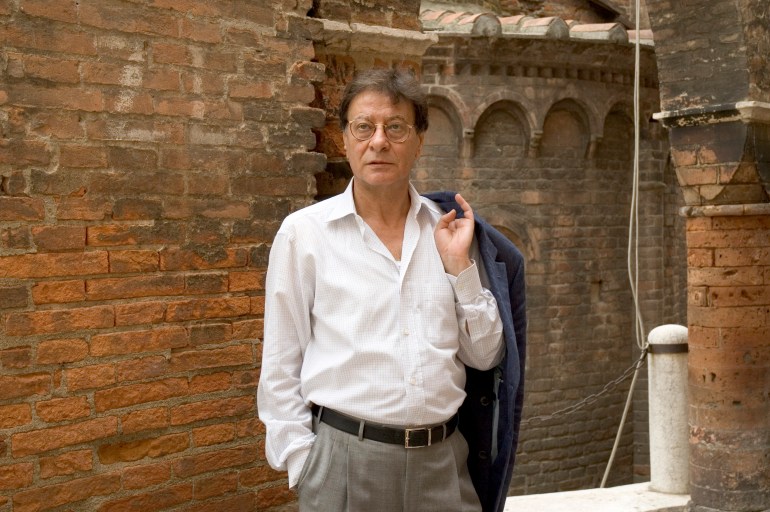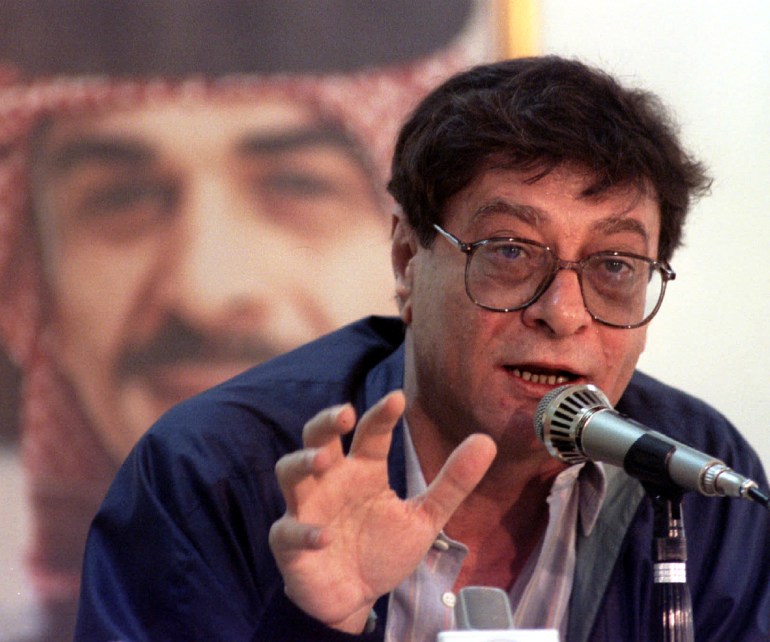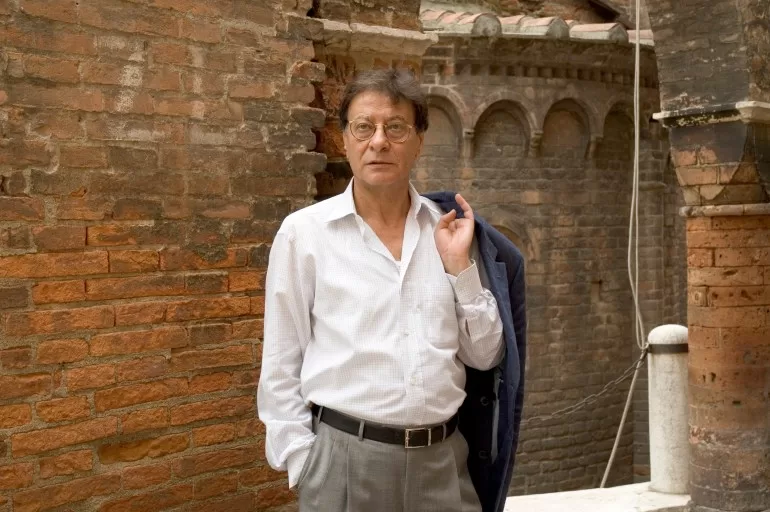Nothing distracts it; nothing takes its fist from the enemy’s face.
Gaza is devoted to rejection…
Hunger and rejection, thirst and rejection, displacement and rejection, torture and rejection, siege and rejection, death and rejection…”
Extracts from Silence for Gaza, Mahmoud Darwish (1973)
These are the words of celebrated Palestinian poet Mahmoud Darwish, penned 50 years ago and perhaps more poignant now than ever as Gaza is devastated by more than five months of an Israeli onslaught that has killed more than 31,000 people and destroyed vast swaths of its infrastructure.
Born on March 13, in 1941, Darwish is feted as Palestine’s national poet for his words expressing the longing of Palestinians deprived of their homeland, which was taken by Zionist militias to make way for present-day Israel.
His poetry gave voice to the pain of Palestinians living as refugees and those under Israeli occupation for nearly a century.
Today, Al Jazeera remembers Darwish, whose words are relevant today as the hopes of a free Palestine struggle against increasing Israeli control of the occupied West Bank and Gaza.
Darwish died in 2008 after open-heart surgery leaving behind more than 30 collections of lyrical Arabic poetry.
Translated into 39 languages, Darwish’s laments of loss, longing and exile spoke to people struggling against occupation around the world.
The power of poetry
For Palestinians, words are often the only weapon available to fight back, finding the power to shape perception.
Atef Alshaer, a senior lecturer in Arabic language and culture at London’s University of Westminster, says Palestinian poetry “moves people to action, protest, commemorate, to remember, and bear witness”.
“In the absence of a fair response to Palestinian political outcries, poetry has helped to give shape and voice to what they have lost,” he tells Al Jazeera.
Darwish did just that, becoming the voice of the Palestinian people.
On this Earth, there is what makes life worthwhile:
On this earth is the Lady of Earth, the mother of all beginnings, the mother of all endings.
Her name was Palestine.
Her name became Palestine.
My Lady, because you are my Lady, I deserve life.
On this Earth (year unknown)

Who was Mahmoud Darwish?
The second of eight children, Darwish was born to a modest farming family in the village of Barweh, Akka (Acre) – an Arab city destroyed by Zionist militias in 1948, its remains absorbed into Israel.
At the age of six, Darwish saw his village razed to the ground along with hundreds of others during the Nakba of 1948 during the founding of Israel.
His family joined 750,000 other Palestinians forced into exile, fleeing violent attacks by Zionist militias and the newly formed Israeli military, in search of a safe home elsewhere.
Settlement camps in neighbouring Lebanon took in 110,000 Palestinian refugees, including the Darwish family.
A year later, Darwish and his family returned to their village home only to find it burned to the ground.
They moved to Deir al-Asad, a Palestinian village about 15km (nine miles) away, where they tried to rebuild their lives as internally displaced people (IDPs), unable to return to their home.
Thousands of Palestinians who remained in Israel after 1948 were dubbed “present-absent aliens” — physically present, but returning to their properties because they were absent when Israel took those over, since they had fled fearing violence.
Among the exiled was also renowned Palestinian writer Ghassan Kanafani, also from Akka, who was 12 in 1948.
They would join the wave of revolutionary Palestinian writers like Samih al-Qasim (How I Became an Article), Fadwa Tuqan (The Night and the Horsemen) and Tawfiq Zayyad (Here We Will Stay) who would go on to unpack themes of exile, identity and resistance. Darwish would later say, “Every beautiful poem is an act of resistance.”
Becoming Palestine’s national poet
A 14-year-old Darwish read out a poem he had written in class, at his school in Kafr Yasif (11km or seven miles from Akka). The poem described a Palestinian boy complaining to a Jewish boy:
You can play in the sun as you please, and have your toys, but I can’t.
You have a house, and I have none.
You have celebrations, but I have none.
Why can’t we play together?
Israel’s military officials decided to answer the question the poem posed — by threatening Darwish that if he continued with such poetry, his father could lose his job at the local quarry.
Undeterred, Darwish kept writing his poems, with his early works — soon after he completed high school — appearing in left-wing newspapers.
His poetry spread, going on to be “sung by fieldworkers and schoolchildren”, write Munir Akash and Carolyn Forche in the introduction to the English translation of his works: Unfortunately, it was Paradise.
His writings were read by Palestinian children. His poems were sampled in songs, painted on the walls of buildings in refugee camps in Jordan, Lebanon, the occupied West Bank and beyond – camps that were built to be temporary.
In March 2000, Yossi Sarid, Israel’s education minister, suggested including Darwish’s poems in the Israeli high school curriculum but Israel’s Prime Minister Ehud Barak overruled him.

At the time, Darwish responded: ”The Israelis do not want to teach students that there is a love story between an Arab poet and this land … I just wish they’d read me to enjoy my poetry, not as a representative of the enemy.”
The Palestinian poet was part of the cultural mainstream for Mustafa Abu Sneineh growing up in Jerusalem.
“His voice is there in the head of every young Palestinian poet,” Abu Sneineh, a poet and writer himself now living in London, tells Al Jazeera.
“I know this because I had to work hard to get it out of my head and learn to protect my voice.”
Abu Sneineh believes the 50 years of Darwish’s writings documenting the history of Palestine from 1948 onwards were what made him the national poet.
“At every point in Palestine’s modern history, Darwish was there … narrating the Palestinian experience in exile, in refugee camps, and under Israeli occupation.
“He captured all that with a personal touch, with stories of love and friendship.”
Writing to resist
Darwish’s status as a “present-absent alien” meant he could not travel without the correct permit. Doing so would lead to his imprisonment, which happened at least five times between 1961 and 1967.
His poem Identity Card – part of his poetry collection Leaves of the Olive Tree in 1964 – led to his house arrest, while Palestinians turned it into an anthem for protest.
Write down
I am an Arab
And my identity card number is fifty thousand
And I have eight children
And the ninth arrives in a summer.
Does this bother you?
Identity Card (1964)
By 1970, Darwish left Israel for the USSR, then moved to Cairo in 1971 to work for Al Ahram newspaper and then to Beirut where he joined the Palestine Liberation Organization’s (PLO) executive committee in 1973.
A year later, he wrote PLO leader Yasser Arafat’s speech to the United Nations General Assembly, which included the now famous line: “Today I have come bearing an olive branch and a freedom fighter’s gun. Do not let the olive branch fall from my hand.”
But first, independence
While in exile, Darwish worked with fellow Palestinian intellectual Edward Said on the 1988 Palestinian Declaration of Independence in which the PLO announced its support of a two-state solution.
Declared at a summit in Algiers, it paved the way for Palestine’s recognition as a state and effectively made Yasser Arafat its president.
But Said and Darwish became leading critics of the 1993 Oslo Accords, believing Palestinians had pulled the short straw. The poet resigned from the PLO executive committee.
The status of Jerusalem, Palestinian refugees, Israeli settlements, security arrangements and borders were unresolved under the accords, disappointing Darwish who felt it was a “cloak and dagger” move by Israel who did not plan to honour the agreement, according to Abu Sneineh.
But it was the Oslo Accords that allowed Darwish to return to Palestine and settle in Ramallah in 1996.
No longer politically aligned, he criticised the political factionalism between Fatah and Hamas, the two main Palestinian parties, in 2007, saying the infighting between them made establishing a Palestinian state even more unlikely.
“One people now have two states, two prisons who don’t greet each other. We are victims dressed in executioners’ clothing.”
Are his words still relevant today?
Darwish’s poetry is being rediscovered by a new generation, as the hashtag #mahmouddarwishpoetry has gained nearly 18 million views on TikTok and social media is awash with his poems.
“His eloquence and originality are unparalleled and ever relevant to the conditions of Palestinians, particularly now in Gaza, where Palestinians suffer the consequences of an Israeli genocide supported by the US against them,” says Alshaer.
“People find representations in his poetry for their innermost feelings amidst the carnage and sadness engulfing them.”
As Darwish wrote:
The war will end
The leaders will shake hands
The old woman will keep waiting for her martyred son
That girl will wait for her beloved husband
And those children will wait for their heroic father
I don’t know who sold our homeland
But I saw who paid the price.
The War Will End
